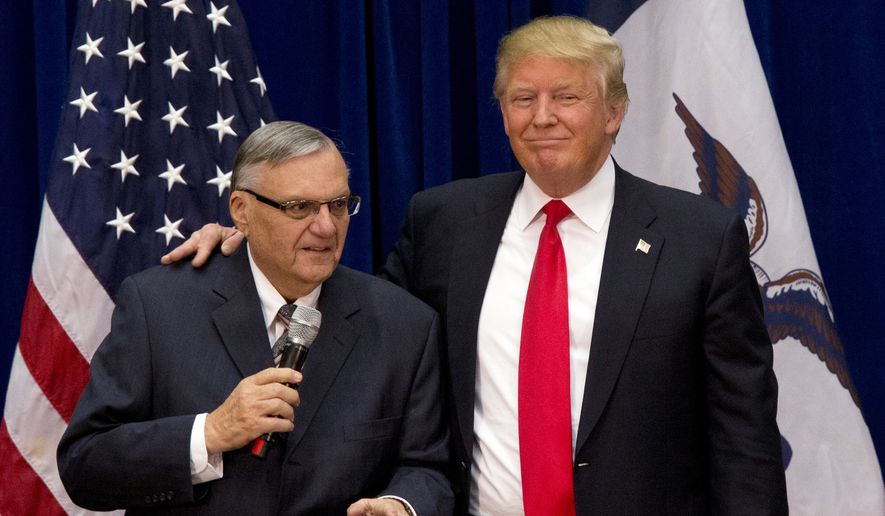The Trump administration renewed its defense of former Sheriff Joe Arpaio on Thursday, telling a federal judge that not only has the lawman been pardoned, but that his original conviction needs to be stripped from the record altogether.
Justice Department lawyers conceded there’s no direct precedent for a case like Mr. Arpaio’s, but they said in the cases that do come closest, circuit courts of appeals and the Supreme Court have indicated that vacating the conviction is appropriate, because his case was never completely finalized.
“In this case, no final judgment of conviction has been entered,” the Justice Department said. “Vacatur is appropriate given the presidential pardon.”
President Trump’s pardon last month has likely freed Mr. Arpaio from the danger of jail time — though some anti-Trump activists have said Judge Susan Bolton, overseeing the case, should even ignore the pardon and still put Mr. Arpaio behind bars.
Judge Bolton hasn’t tipped her hand on those demands, but she has taken a skeptical line on Mr. Arpaio’s request that his actual conviction on a criminal contempt of court charge be tossed.
“U.S. Supreme Court and Ninth Circuit case law suggest that a presidential pardon leaves intact the recipient’s underlying record of conviction,” she wrote last week, challenging the Trump administration to defend its position.
She convicted Mr. Arpaio in July of contempt of court, finding he willfully ignored another judge’s order to cease a traffic-stop program that netted illegal immigrants who were then turned over to federal officers for deportation.
His lawyers say Judge Bolton misconstrued evidence during the trial and wrongly refused his request for a jury trial.
Mr. Arpaio’s legal team had asked her to toss out her own ruling or at the least to grant him a new trial before a jury. Barring that, Mr. Arpaio’s lawyers had said they would appeal.
Mr. Trump’s pardon last month — the first of his tenure, granted to one of his earliest and staunchest political supporters — short-circuited all of that.
Judge Bolton’s resistance to expunging the conviction could feed into Mr. Arpaio’s claims that the federal courts in general, and Judge Bolton in particular, have been hostile to him.
Both Arpaio lawyers and the Justice Department say that when a person convicted of a crime dies before his appeals are exhausted, the conviction is vacated — a situation someone close to Mr. Arpaio’s situation.
More to the point, the Justice Department said, is a 2001 case in Washington, D.C., where a pardon came while a case was pending on appeal and requests for a retrial over charges of bribery.
President Clinton issued a pardon, and the U.S. Circuit Court of Appeals for the District of Columbia, which was hearing the appeal, said the pardon not only cut short the wrangling over a new trial, but compelled the original conviction to be vacated.
• Stephen Dinan can be reached at sdinan@washingtontimes.com.




Please read our comment policy before commenting.